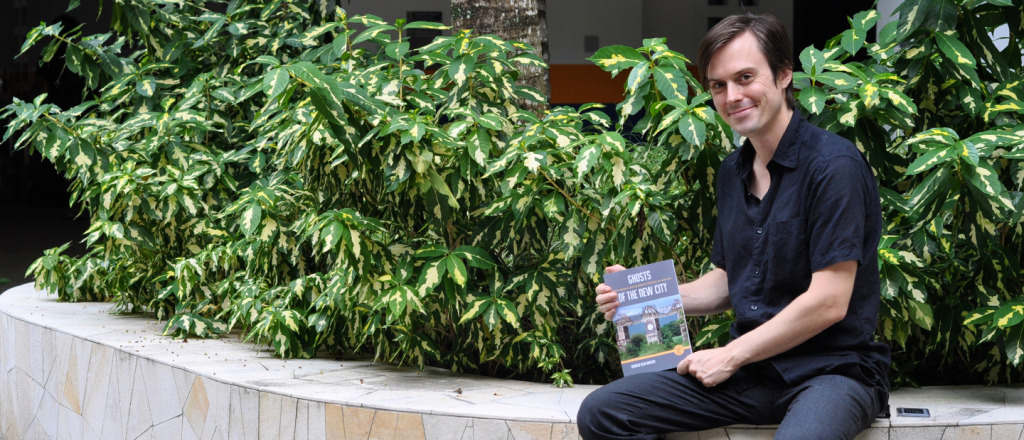Assistant Professor Andrew Alan Johnson talks about Ghosts of the New City

Almost 10 years ago, Yale-NUS Assistant Professor of Social Sciences, Andrew Alan Johnson (then a PhD student), started looking at Chiang Mai, Thailand, on the subject of middle-class space. As he immersed himself in fieldwork, his focus soon shifted from the booming middle-class population to the belief in indigenous spirits that still have a strong cultural presence even as new city spaces are developed.
Since then, Professor Johnson has spent his time preparing for research (including learning and becoming fluent in Thai and kammeuang), then conducting fieldwork. The point of anthropological research, he says, is to experience a place firsthand and understand as best as you can the worldview of those who live there. The result of his efforts is his new book, Ghosts of the New City: Spirits, Urbanity, and the Ruins of Progress in Chiang Mai (University of Hawi’i Press, 2014).
Professor Johnson took some time in between teaching classes to answer our questions on his book and research.
What is your book about?
Professor Johnson: It’s about ghosts, yes, and Northern Thai spirit cults (what we might call animism, to use a slightly outdated term), but I also deliberately use the word “ghost” to refer to the idea of something that appears uninvited, something that secretly dwells in a place (or in an idea) and emerges at unexpected moments.
In the book, one such “ghost” is the idea that progress does not always manifest; that our expectations that prosperity and well-being will only increase are often incorrect. In Thailand as in many places, there is an overriding assumption that the future will only get better, that technology leads to greater prosperity and happiness. Hence the focus on abandoned buildings (the “new city,” also a play on the literal translation of “Chiang Mai”) – these are signs that the future can and often does hold ruinous potential.
What were some of the challenges you faced while researching and writing Ghosts?
After all the preparation, there’s the actual fieldwork, which in my case was about two years, between 2006 and 2008. This can be intensely personal for everyone involved: privacy, personal space, and time alone are things you have to dispense with. And there’s always random things that happen: I fended off offers to buy property and settle down in Chiang Mai, marriage proposals, dog attacks, food poisoning, people trying to get me to play guitar on stage, and traffic accidents. While I was there, Thailand went through street protest, coup d’etat, and military rule. It was an intense time.
What were some particularly memorable moments you had in the course of writing this book?
I was eating at Kentucky Fried Chicken with Noi, the daughter of one of my medium friends. We had just been to a temple and I was nattering on about how I liked the nagas (water dragons). “It’s like when I was young,” I remember saying, “I loved dinosaurs.”
“But Andrew,” she told me, “Nobody knows if there were dinosaurs. Nobody’s ever seen a dinosaur. People see nagas all the time.”
This exchange reminded me of the deep gulf in worlds that exists between people – not just people of different places, but between all of us. We can never really inhabit or know the mind of another. Noi lives in a world where water dragons are active, real entities, and I do not. Understanding her world, to the extent that such an understanding is possible between any two people, requires setting aside a lot of assumptions that I bring with me from my world.
What are some pet peeves you have while you’re writing?
Doing research, there was a continual thing that I began to call the “we’re here” problem. A bunch of people would show up and announce, “We’re here.” It didn’t matter if I was reading or sleeping or tired of speaking Thai, people had arrived and it was time to talk, time to go out and eat, time to be social. One can’t say no at these times – we’ve only got a short time allotted for fieldwork, time that has to be used. But it was exhausting.
The other difficulty is related to managing time off. We cannot do our research at home – even if our fieldsite is our hometown, the intensive nature of fieldwork means that it has to consume all of our time. We cannot have the logic of time in the field fit our own schedule, rather, we have to adapt our own schedule to that of the fieldsite. What this all means is that holidays, summers, any leave time away from school for any significant amount of time must be spent researching. This puts pressure on vacations for fun or opportunities to visit parents and friends: most of my friends haven’t seen me in years!
—
Professor Johnson continues to conduct research in two new areas related to Thailand, with two new book projects in the works.
| Upcoming Event: Book launch and Seminar for Ghosts of the New City Organised by the NUS Faculty of Arts and Social Sciences (FASS) Date: 20 November 2014 Time: 11am Venue: FASS Research Division Seminar Room (AS7 06-42) Please RSVP with the title ‘JOHNSON’ to fasscities@nus.edu.sg by 13 November. |





